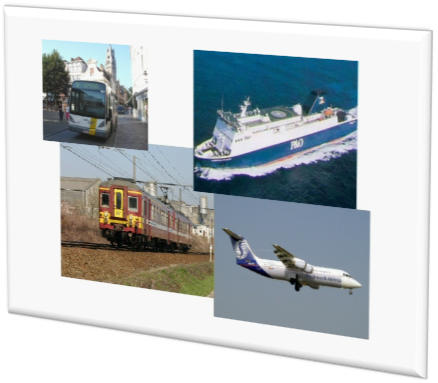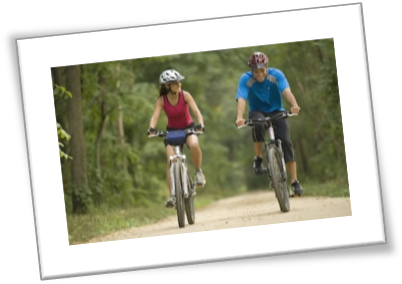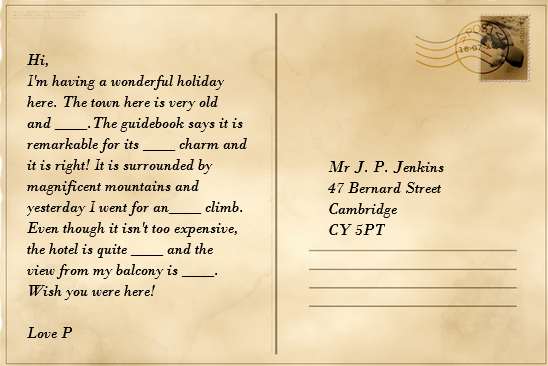
- •Travelling
- •Travel Broadens the Mind
- •Why Do People Love to Travel?
- •Places to Visit
- •10 Міст, які потрібно побачити хоча б раз у житті
- •1. Стамбул, Туреччина
- •Why should we use public transportation?
- •Is Turkey a safe place to travel?
- •Organizing For the Holidays Organizing For the Holidays . . . Less Stress . . . More Fun
- •1. Why did the writer make the trip?
- •City Bus History
- •Поради туристам при подорожі автобусом по Європі
- •The History and Invention of the Airplane
- •My First Flight
- •A romantic resort
- •Biking Down Under
- •Ecotourism
- •Guilt-Free Holidays
- •Inca Cable Car
- •In pairs, name three of the most important historical sites/ buildings in your country. What do you know about them? Discuss.
- •Dreaming of a Green Vacation
- •In the dictionary find synonyms for the following words and expressions.
- •Insert the Present Simple or Present Continuous.
- •Insert the Present Perfect or Past Simple.
- •Insert the Past Indefinite or Past Perfect.
- •Insert the Past Continuous or Past Perfect.
- •Insert the Present Perfect or the Present Perfect Continuous.
- •Insert the Present Continuous or the Present Perfect Continuous.
- •Insert the Past Simple, Past Perfect, or Past Perfect Continuous.
- •Insert the Past Continuous, Past Perfect, or Past Perfect Continuous.
- •Insert the Present Simple or Future Indefinite.
- •Throughout history, key discoveries have changed the course of medical science. We look at four historic medical breakthroughs.
- •Asymbol of medicine, a triumph of simplicity
- •1. In the first paragraph, the writer mentions "hi-tech diagnostic equipment" in order to
- •Examination Fever
- •Say No to Death
- •Україна – перша у Східній Європі за кількістю віл-інфікованих.
- •At the dentist’s
- •General Dental Practice
- •Help me, doctor, I'm too wealthy
- •1. Qigong is perfect for those who
- •Are You on the Top of the World
- •Евтаназія: вбивство чи милосердя? а може, вбивство з милосердя?
- •Exercise 3. Translate into English, using the Passive or Active Voice.
- •1. Questions and negations of the verb have are formed with do/does or did.
- •2. We can also use have something done to say that something unpleasant happened to somebody.
- •3. We can use the verb get instead of the verb have only in informal conversation.
- •Value of Education
- •Value of Education
- •Investing in education is the single most effective way of reducing poverty.
- •Makes People Healthier
- •Increases Income
- •Promotes Girls' and Women's Rights
- •Is literacy important?
- •Opportunity, Equality of Education
- •Distance Learning
- •What are mooCs?
- •The System of Education in the United Kingdom
- •Education
- •British or American?
- •Education in Ukraine
- •Choosing a university
- •6 Important Criteria to Choose the Best University
- •1. Programme of studies
- •2. Official language(s)
- •3. Duration of your studies
- •4. Central or more suburban areas?
- •5. Tuition fees/financial aspects
- •6. Weather/climate
- •A little advice
- •Is the situation with regard to university education the same in your country as it is in the uk?
- •Universities
- •In your country is the university system the same or different to the one described in this article? Do you agree more with the opinion of Theodore Roosevelt or of Sydney Harris? Why?
- •Video ‘Knowledge is Great’
- •What makes a global Top 10 university?
- •Immigration points
- •How I Got My First-Class Degree
- •In small groups, discuss the following questions.
- •Beating exam stress
- •Подолання стресу під час сесії. Поради психолога.
- •Grammar focus reported speech (indirect speech) in English
- •Reported statements
- •1.1. The introductory sentence in the Simple Present.
- •1.2. The introductory sentence in the Simple Past.
- •Backshift of Tenses
- •Types of introductory sentences
- •Reported commands/requests
- •Student Dilemma
- •Євген Нищук. Монологи.
Why should we use public transportation?
The Rising Environmental Cost of Driving Alone
Transportation accounts ____ more than 30 percent of U.S. carbon dioxide emissions. According ____ the American Public Transportation Association (APTA), public transportation in the United States saves approximately 1.4 billion gallons ___ gasoline and about 1.5 million tons of carbon dioxide annually. Yet only 14 million Americans use public transportation daily ____ 88 percent of all trips in the United States are made ___ car – and many of those cars carry only one person.
Added Benefits of Public Transportation
Consider ____ other benefits of public transportation:
Energy independence – According to Treehugger.com, if ___ one in 10 Americans used public transportation daily, U.S. reliance ___ foreign oil would decrease 40 percent.
Safety – Riding a bus is 79 times safer than riding in an automobile, and riding a train or subway is ____ safer.
Health – Studies have shown that people who use public transportation regularly tend ____ be healthier than people who don't, because of the exercise they get walking ___ and from bus stops, subway stations and their homes and offices.
Cost savings – According to an APTA study, families that use public transportation can reduce their household expenses by $6,200 annually, more ____ the average U.S. household spends on food every year.
|
30 |
|
liner |
sail |
long-haul |
platform |
cruise |
|
toll |
runway |
compartment |
make for |
stopover |
|
registration number |
break down |
see off |
jet lag |
run out of |
|
stand-by |
station wagon |
crossing |
roundabout |
ticket collector |
|
track |
set off |
drop off |
highway |
starboard |
|
press on |
self-drive |
guard |
harbour |
gangway |
Add two more words to each set and compare your sets with those of other students.
|
31 |
At 6.13 p.m. we set off from Victoria Station aboard the Orient Express in our first-class compartment…
|
32 |
-
AIR
RAIL
SEA
COACH
|
33 |

 ork
in groups and list some different means of transport.
ork
in groups and list some different means of transport.
Then discuss these questions.
a. What are the advantages and disadvantages of each one for long or short distances?
b. How do you prefer to travel? Why?
|
34 |
Departures
This is the usual sequence of activities when you get to the airport.
First
you go to the check-in
desk
where they weigh your luggage.
Usually you are permitted 20 kilos, but if your bags weigh more, you
may have to pay excess
baggage
(=you pay extra). The airline representative checks your ticket and
gives you a boarding
card
for the plane with your seat number on it. Then you go through
passport
control
where an official checks
[NOT controls]
your passport, and into the departure
lounge.
Here, you can also buy things in the duty-free,
e.g. perfume, alcohol and cigarettes. About half an hour or forty
minutes before take-off,
you are told to go to a gate number, e.g. gate 14, where you wait
before you get
on
the plane. When you board
(=get on) the plane, you find your seat. If you have hand
luggage,
you can put it under your seat or in the overhead
locker
above your seat.
The plane then taxis (=moves slowly) towards the runway, and when it has permission to take off, it accelerates along the runway and takes off.
Note: The verb to taxi is generally only used in this context.
The flight
You may want or need to understand certain announcements; these come from the captain (=the pilot) or from an air steward or stewardess / cabin crew / flight attendants (= people who look after the passengers):
Please fasten your seat belt and put your seat in the upright position.
We are now cruising (=flying comfortably) at an altitude (=height) of 10,000 metres.
May we remind passengers (=ask passengers to remember) that there is no smoking until you are inside the terminal building (=where passengers arrive and depart).
The cabin crew (= air stewards) are now coming round with landing cards. (These are cards you sometimes have to fill in when you enter certain countries.)
Arrival
When the plane lands (= arrives on the ground), you have to wait for it to stop / come to a halt. When the doors are open, you get off the plane and walk through the terminal building and go to the baggage reclaim where you collect your luggage. You then pass through customs (green = nothing to declare; red = goods to declare; blue = European Union citizens). If you are lucky, you can then get a bus, taxi or train to the centre of town without waiting too long. You can also hire a car (= rent a car) at most airports.
Note: In British English you normally hire something for a short period, e.g. hire a room for a party, and rent something for a long period, e.g. a flat; for a car, you can use both words.
|
transport type |
different kinds of vehicle |
parts of vehicle |
people working with it |
associated facilities |
|
road |
sports car, estate car, bus, coach, tram, van, lorry |
boot, engine, gears, steering-wheel, brakes, tyres |
driver, mechanic, chauffeur, bus- conductor |
petrol station, garage, service station |
|
rail |
passenger train, freight train, local train, express |
sleeping-car, buffet, restaurant-car, compartment |
engine-driver, ticket collector, guard, porter |
waiting-room, ticket office, signal-box |
|
sea |
fishing-/rowing-boat, liner, ferry, yacht |
engine-room, deck, bridge, gangplank |
captain, purser, docker, steward (ess) |
port, buoy, customs, light-house, docks |
|
air |
aeroplane, jet, helicopter, supersonic aircraft |
cockpit, nose, tail, wings, aisle, joystick |
pilot, ground staff, steward, cabin crew, air traffic controller |
duty-free shop, departure lounge, runway |
At sea – a bedroom is a cabin, a bed is a bunk, the kitchen on a ship is a galley, right is starboard and left is port and the group of people who work on the ship is called the crew. These terms are also used for an aircraft. Sailors also refer to their vessels as ‘she’ rather than ‘it.
|
35 |
Here are some more words which could have been included in the table in Ex. 34. Where would they fit into the table?
|
bonnet |
balloon |
deck-chair |
guard’s van |
mast |
petrol pump |
|
bus driver |
anchor |
glider |
oar |
rudder |
left luggage lockers |
|
check-in desk |
control tower |
canoe |
|
dual carriageway |
|
|
36 |
Yesterday John was supposed to take a ______ from London to Amsterdam. He got up very early, put his luggage in the ______ of his car and tried to start the engine. It wouldn’t start. John lifted the ______ but he couldn’t see what the matter could be. He immediately called his local _______ to ask them to send a ______ at once. Fortunately, the garage had a man free and he was with John within ten minutes. He quickly saw what the matter was. ‘You’ve _______ of petrol,’ he said. John felt very foolish. ‘Why didn’t I _____ everything last night?’ he wondered. Despite all this, he got to the airport, checked in quite early and then went straight through to the _____ to read a newspaper while he waited. Soon he heard an announcement. ‘Passengers on flight BA 282 to Amsterdam are informed that all flights to and from Amsterdam are _____ because of a heavy snowfall last night.’ ‘If only I had decided to go by _____’, John thought. ‘It would probably have been quicker in the end and even if I sometimes feel sick on the _____ it can be quite pleasant sitting in a _____ on the deck, watching the seagulls and the other ____. The _____ on a ship seem to produce much better food than those on an aircraft too.
|
37 |
|
38 |
|
A |
B |
|
Cruise |
accommodation of which you share ownership with a number of people, for example you own a twelfth of the apartment so you have the right to stay there for one month every year |
|
Package holiday |
accommodation like a hotel but cheaper and with fewer services |
|
Time-share apartment |
a holiday spent touring on a boat, stopping off to go sight-seeing at different ports |
|
Holiday camp |
a place where you can pitch a tent or park a caravan |
|
Youth hostel |
a place providing holiday accommodation in little chalets or flats, with restaurants, bars, swimming pools and lots of other facilities and entertainment for when visitors want a break from sun-bathing |
|
Guesthouse |
cheap accommodation, mainly for young people, with, perhaps, ten or more people sleeping in bunk beds in one room |
|
Self-catering flat |
a holiday in which you pay for travel, accommodation and food (even occasionally excursions) in advance |
|
Camp-site |
a flat which you rent; you cook for yourself |
|
The language of holiday brochures is often quite exaggerated. Here are some typical adjectives with nouns that they collocate with. Try to find the collocations. | |
|
Unspoilt |
opportunity/beauty/quality [nothing better exists] |
|
Unsurpassed |
cruise ship/accommodation/lifestyle [provides great comfort] |
|
Sublime |
beauty/charm/location [unusual and much more exciting than one’s everyday reality] |
|
Picturesque |
access/club/shops [only the most special people can use the facilities] |
|
Mighty |
charm/village/woodland [still in a beautiful and natural state] |
|
Luxurious |
streets/villages/cottage [as pretty as a picture] |
|
Legendary |
hospitality/figure/status [so special that it has been famous for some time] |
|
Intoxicating |
views/air/fragrance [makes you feel excited and emotional] |
|
Glamorous |
feeling/ride/moment [makes you feel excited and full of energy] |
|
Exotic |
pleasure/simplicity/skill [heavenly or divine] |
|
Exhilarating |
surroundings/film star/hotel [especially exciting and attractive] |
|
Exclusive |
views/scenery/pistes (ski slopes) [ (like stunning) suggests that something is so magnificent that it takes your breath away] |
|
Breath-taking |
river/cathedral/oak [large and powerful] |
|
39 |
Complete these sentences with a word from the Ex. 38.
As soon as we got to the camp site we ______ our tent.
At the youth hostel Jimmy insisted on sleeping in the top _____.
They stayed in a nice little _____ at a holiday camp with two bedrooms and its own living area.
Our hotel offers you unsurpassed _____ for unbeatable prices.
Take a memorable cruise along the ______ Mississippi.
Visitors to our hotel have ______ access to our own private beach.
Experienced skiers can try the most breath-taking of _____.
Be thrilled by visiting the castle of the ______ Count Dracula!
|
40 |
Complete this table. Use a dictionary to help you, if necessary.
|
Adjective |
Noun |
Verb |
|
luxurious |
|
|
|
exhilarating |
|
|
|
glamorous |
|
|
|
intoxicating |
|
|
|
legendary |
|
|
|
41 |
Fill in the gaps in this postcard with appropriate adjectives.

|
42 |
There are some mistakes in the paragraph below. Underline and correct them.
